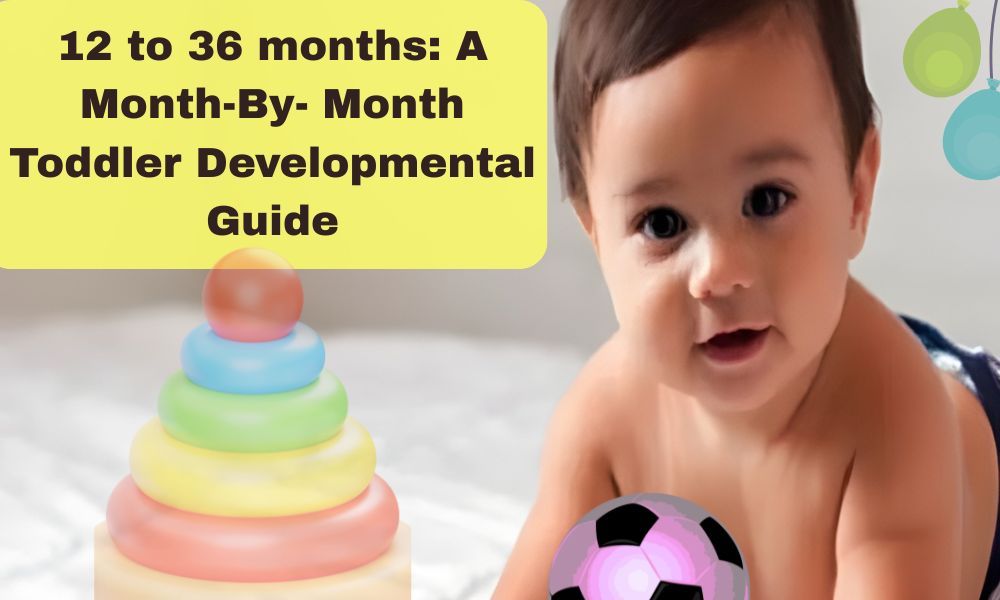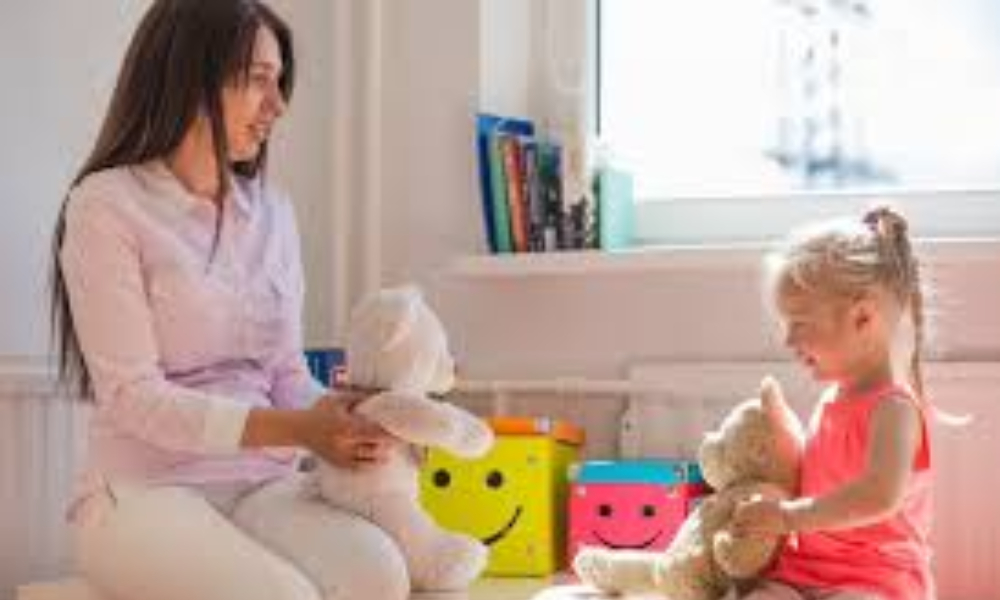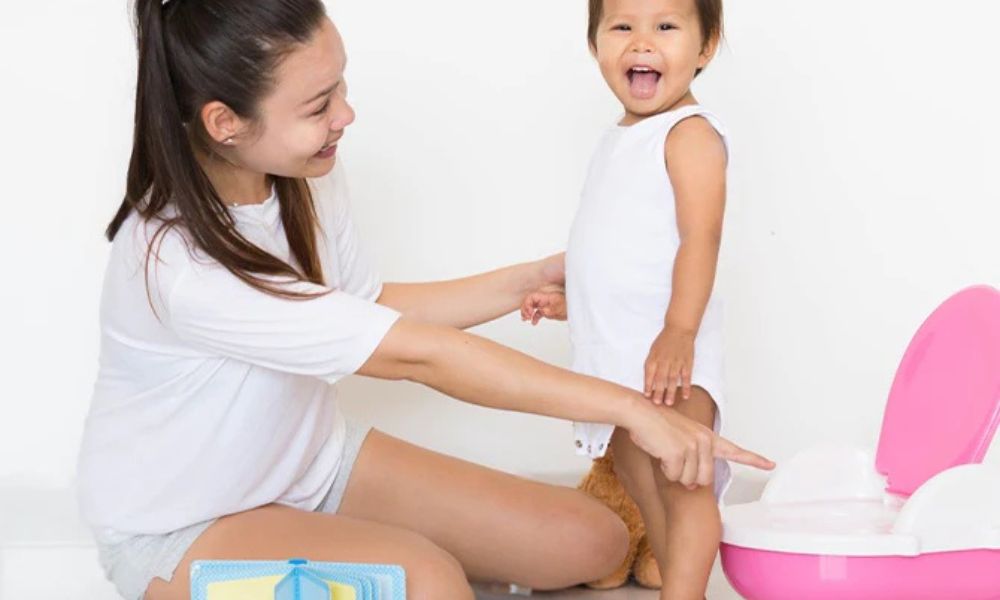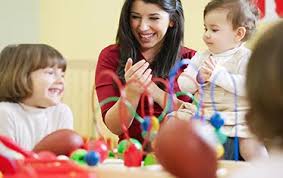12 to 36 Months: A Month-By-Month Toddler Development Guide
Tanzeel Mehak
October 7, 2025

The toddler stage is the most exciting stage in a child’s life. During these, your toddler grows quickly, learns, walks, talks, plays and shows emotions in different ways.
Every month brings something different and each grows your toddler better than before. These small changes feel sudden but together they shape your toddler into a more confident and independent child.
From this guide parents learn what to expect and how to support their toddler’s growth month by month, while also reminding you to enjoy and celebrate each stage along the way.
Understanding Toddler Development From 12 to 36 Months

At the toddler stage, children have social and emotional milestones and learn new skills that help them to grow, communicate and connect with others properly. This stage is important because it builds the basics of learning and social interaction.
Here are the main developing categories of toddlers for developmental growth:
Physical Development:
Toddler’s start walking, running, climbing and using their hands for tasks like feeding themselves, stacking blocks and scribbling.
Cognitive Development:
Their brains grow quickly and start to solve simple problems, remember routines and move from single words to short sentences.
Social Development:
At first, toddlers play alongside other kids, then slowly begin sharing and playing with others.
Emotional Development:
Emotional feelings appear to show empathy, toddlers learn to express themselves and begin to understand who they are.
Month-by-Month Toddler Development 12 to 36

Every month the toddler feels like a new adventure. One day they move with support and the next they are racing with a big smile across the room. Each stage comes with its own little changes and watching these changes is one of the most rewarding parts for parents.
Let’s take a closer look, starting with your toddler’s very first birthday milestones.
12 Months: First Birthday Milestones
- Physical: Your baby may be pulling up, cruising along furniture or even taking those shaky first steps. Get ready once they are moving, there’s no slowing them down.
- Language: Simple, sweet words like mama and dada might come out, along with lots of babbling that sounds almost like real conversation.
- Social: Expect little waves of goodbye and big smiles for familiar faces. They’re showing stronger attachment and love to the people they know best.
- Emotional: Around this age, anxiety of separation can be strong. They may cling when you leave the room, but that’s only because you are their safe place.
13 Months: Growing Confidence
- Physical: Your toddler may be steadier on their feet now, to pick up toys and pull themselves onto furniture.
- Language: They start repeating sounds and try to copy simple words.
- Social: Do not be surprised if they talk on a toy phone or brush their hair like you do.
- Emotional: They are testing independence but still need lots of love when they feel unsure.
14 Months: Little Explorer
- Physical: Climbing becomes a favorite activity and their balance improves every day.
- Language: They begin pointing to objects and may try naming familiar people or pets.
- Social: Simple games like hide and seek are a hit.
- Emotional: Expect more curiosity and maybe a few frustrated tears when they can not do something yet.
15 Months: Curiosity Everywhere
- Physical: Running may begin though a bit wobbly. They may try using a spoon, though it’s still messy.
- Language: Vocabulary grows to 4, 6 words. They understand much more than they can say.
- Social: Copying your actions becomes constant if you sweep, they will help too.
- Emotional: They show love openly with hugs, smiles and laughter, but tantrums may also make an appearance.
16 Months: Busy Little Hands
- Physical: Walking backward, climbing and pushing toys are all favorites.
- Language: They understand words and use gestures like pointing or shaking their head.
- Social: Play becomes more interactive, though they still like to do things their way.
- Emotional: Frustration is common, they know what they want but can not say it.
17 Months: Small Acts of Kindness
- Physical: They may climb stairs with support and start throwing or rolling a ball.
- Language: Following simple instructions, bringing the toy becomes easier.
- Social: You may notice empathy, like handing you a toy if you look sad.
- Emotional: More aware of others but they still rely on you for comfort and security.
18 Months: Toddler on the Go
- Physical: Running improves, and they can stack a few blocks.
- Language: Vocabulary grows to 10 to 20 words. Pretend play like feeding a doll begins.
- Social: They may start to copy household routines, from sweeping to cooking.
- Emotional: Independence is growing fast which means more I do it, moments, along with stronger tantrums.
19 Months: Words and Wonder
- Physical: Your toddler may climb up stairs with help and start to enjoy writing with crayons.
- Language: Simple two word phrases appear like more milk or bye bye.
- Social: Music and dancing bring lots of joy and they love copying actions like clapping or stomping.
- Emotional: They are starting to test limits and may say no often to show independence.
20 Months: Full of Energy
- Physical: They climb with more confidence and may even try kicking a ball.
- Language: They can name familiar people, pets and objects.
- Social: Toddlers at this age imitate family members and siblings, wanting to do whatever you are doing.
- Emotional: You’ll notice more determination. They’ll keep trying until they succeed.
21 Months: Little Talker
- Physical: Running gets steadier and they may build taller towers with blocks.
- Language: Short sentences start forming like I want juice.
- Social: Parallel play continues, they play near other kids but not fully with them yet.
- Emotional: They may show stronger preferences, from favorite toys to favorite foods.
22 Months: Big Vocabulary Jump
- Physical: Turning book pages, using utensils more easily and enjoying puzzles.
- Language: Vocabulary may reach 50 words or more; they start asking simple questions.
- Social: They resist help and want to prove they can do things themselves.
- Emotional: Mood swings appear; they’re learning to manage big feelings.
23 Months: Learning to Share
- Physical: Jumps with both feet, throws a ball overhead and moves with more confidence.
- Language: Using pronouns like me and you.
- Social: Early turn taking appears, especially during games.
- Emotional: They may copy emotions and laugh when you laugh or frown when others are upset.
24 Months (2 Years): Big Milestone Birthday
- Physical: Runs well, climbs furniture and may start pedaling a tricycle with help.
- Language: Vocabulary grows to 200+ words and two word sentences become common.
- Social: Parallel play is strong, but they may start brief moments of group play.
- Emotional: Independence peaks expect lots of mine and no moments.
25 Months: Early Pretend Play
- Physical: Motor skills improve like climbing higher and handling small toys better.
- Language: Can follow two step commands like Pick up the toy and give it to me.
- Social: Pretend play expands like cooking, feeding dolls or following adults.
- Emotional: Stronger awareness of routines they feel secure.
26 Months: Curious Learner
- Physical: Stacking, puzzles and better hand eye coordination.
- Language: Sentences expand to 3 or 4 words.
- Social: May cooperate briefly in group play.
- Emotional: Begin to manage emotions.
27 Months: Kindness Blossoms
- Physical: Climbing stairs alone, using more controlled movements.
- Language: Using plurals and more complex words.
- Social: Starts to comfort friends or family who are sad.
- Emotional: They are proud of achievements and may seek praise for helping.
28 Months: Imagination Sparks
- Physical: Better balance when running or kicking.
- Language: Names colors and shapes.
- Social: Make believe games grow richer pretending to be a parent, superhero or animal.
- Emotional: A stronger sense of self; they may insist on doing things their way.
29 Months: Memory Builder
- Physical: Dressing with some help, turning knobs and enjoying more physical independence.
- Language: Uses grammar more naturally like I went, I’m going.
- Social: Expresses feelings openly, sometimes dramatically.
- Emotional: May remember and talk about past events We went to park.
30 Months (2.5 Years): Strong Opinions
- Physical: Confident running, climbing and jumping.
- Language: Vocabulary grows up 200 to 300 words.
- Social: Defiance kicks in lots of No as they test limits.
- Emotional: They want to do things on their own, even if they’re not quite ready.
31 Months: Early Storyteller
- Physical: Drawing simple lines and circles.
- Language: Longer sentences and little stories.
- Social: Starting to follow rules in play.
- Emotional: Stronger self awareness like they may say, I am happy or I mad.
32 Months: Busy Builder
- Physical: Builds towers of 6–8 blocks, more refined fine motor skills.
- Language: Past tense verbs appear. I played and questions ask.
- Social: First real friendships may form.
- Emotional: More patience in play but still struggles with waiting.
33 Months: Play Together
- Physical: May hop briefly on one foot, more confident movements.
- Language: Sentences of 4 to 5 words.
- Social: Cooperative play starts, they join in games rather than playing alone.
- Emotional: Shows pride in achievements and enjoys praise.
34 Months: Creative Thinker
- Physical: Improved coordination, tries scissors with help.
- Language: Understands under, on and in.
- Social: Pretend play becomes more detailed and creative.
- Emotional: Starts to understand the idea of rules and fairness.
35 Months: Little Negotiator
- Physical: Climbs well and balances on one foot briefly.
- Language: Understands simple time words like soon and later.
- Social: Negotiates in play may trade toys or roles.
- Emotional: Stronger ability to share, though it’s still a work in progress.
36 Months (3 Years): Preschool Ready
- Physical: Rides a tricycle, climbs easily and runs with full control.
- Language: Vocabulary may reach sentences with full conversations.
- Social: They play cooperatively, make friends and enjoy group activities.
- Emotional: Greater self control appears in them. They begin to understand feelings of both their own and others.
Supporting Toddler’s Development Across 12 to 36 Months

The toddler years are busy, exciting and full of firsts. Every child grows at their own footsteps, there are many ways for parents to encourage their toddler growth and learning during this stage. With a mix of love and play, you can support your toddler’s physical, social and emotional developmental growth every day.
Encourage Language:
Read simple books, sing songs, and talk about daily activities. Respond to their babbles and words to show them communication is important.
Support Motor Skills:
Give safe spaces for climbing, running and exploring. Use toys like balls, blocks and push toys to build coordination.
Build Social & Emotional Skills:
Play pretend, practice sharing and keep steady routines. Name their feelings to help them understand emotions.
H2: When to Seek Guidance
Every child develops at their own pace, but sometimes delays they need for extra support. You should choose a gentle parenting style at the first for better development of your child. Trust your feelings as a parent if something feels off, it is always okay to ask your doctor.
- If a child is not walking at age of 15 months: Most toddlers take their first steps between 12 to 15 months. If your baby is not walking for 18 months or seems to struggle with movement then go to check a doctor.
- If speech is very limited at the age of 2 years: By the age of two years, toddlers usually say at least 50 words and begin forming simple two word sentences. If your child speaks very few words or doesn’t try to communicate, check out the doctor.
- If a child does not engage socially at the age of 3 years: At this stage, mostly children enjoy playing with others, copying adults and showing emotions. If your toddler does not make eye contact and avoids interaction with others then discuss with a professional.
Early guidance does not always mean that something is wrong, it simply ensures your child gets support if needed.
Conclusion: Toddler Development
The toddler years are full of learning and change in growth. From those first unsteadily steps to confident running or from single word to full conversation, each step towards independence. These months feel like passing quickly but they are filled with joy and unforgettable firsts.
The important thing is to remember that every child grows at their own feet. Some toddlers reach on this earlier, while others take a little longer but that’s perfectly okay. The most important thing that matters is creating a safe and loving environment where your child can grow perfectly.
Celebrate each small success, enjoy the little moments and also trust the journey of your toddler’s development can make your life journey peaceful.



